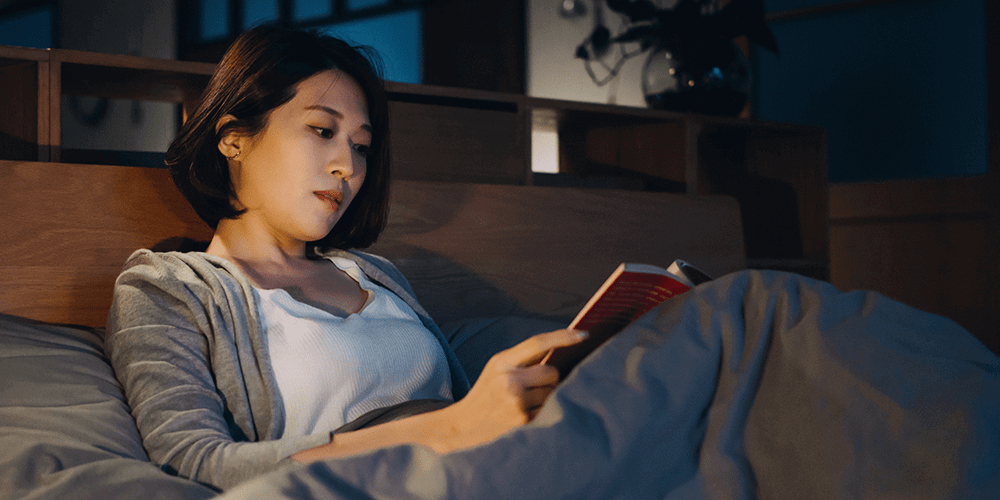Healthy Sleep Starts Before You Hit the Sheets

Improve how you sleep with small changes to your evening routine
When you aren’t sleeping well, you aren’t your best. A bad night of sleep leaves you with that head-in-the-clouds feeling the next day—fatigued, unfocused, and forgetful—along with other undesirable effects.
According to the National Sleep Foundation’s 2022 Sleep in America® Poll, a lot of Americans can do more to help keep their precious bedtime hours safe from tossing, turning, and waking up too often.
Fortunately, there’s hope for the restless because there are actionable steps you can take to set up an ideal environment for sleep and improve your nighttime routine. Use these tips to get a better night of sleep—so you can spring out of bed in the AM feeling like your Best Slept SelfTM.
Fine-Tune Your Sleep Routine
A bedtime routine carried out each night teaches your body that it’s time to go to sleep. Your routine can incorporate some simple lifestyle changes that can help you get enough of the quality sleep you need.
Consistent dinner times can be an important cue for your circadian rhythm—your natural sleep-wake cycle. Meals eaten too close to bedtime can negatively affect your ability to go to sleep. Eating a light dinner 2-3 hours before bedtime is ideal so that your food can be fully digested. Try to avoid heavy meals, as well as alcohol, at night—both of which can disrupt your sleep.
Gentle stretching or meditation can also reinforce signals that it’s time to fall asleep. Even smells can help calm your senses and reduce stress, so try diffusing essential oils in scents like lavender.
Follow a Sleep Schedule
Going to bed or waking up at the same time every day of the week helps your ability to fall asleep when you want to. Also, a regular schedule helps to sync your circadian rhythm, which dictates when you feel sleepy or awake.
Most adults should aim to get seven to nine hours of sleep per night. Keep your sleep schedule consistent by going to bed at the same time every night and waking up at the same time every morning, even on weekends.
Turn Out the Lights
As you continue to wind down in the evening, dim the lights. Dim light at night helps regulate the circadian rhythm.
Blackout curtains and blinds are even better because they eliminate light pollution and remove outside light, creating a dark environment that’s primed for sleep.
Stop Looking At Screens
There’s a good reason why your brain still feels wide awake when you’re scrolling at 2 AM. Electronic devices emit blue light and prevent the natural production of melatonin—the chemical that tells your brain that it’s time to sleep.
However, over half of Americans polled say that they look at screens within an hour before bedtime or in bed before going to sleep.
Ideally, your bedroom should be free from televisions, tablets, phones, and laptops. If it’s not possible to remove blue-light-emitting electronics from the bedroom completely, simply turn them off and stop using them for at least an hour before you go to bed.
If you like to read before bed, try switching out your tablet or phone for a real book. It’s a simple tweak, and you’ll notice how much faster you will drift off to sleep.
Create a Comfy Environment for Sleep
A dark, cool bedroom that is free of distractions is the ideal place to get a good night of sleep.
Add items to your bedroom that enhance sleep comfort. Invest in cozy bedding. Find a comfortable pillow that will help support your neck and back throughout the night. And look for mattresses and pillows that support your spine.
If you’re a hot- or cold sleeper, find bedding that’s designed to help maintain your ideal temperature. Keep the room temperature cool, between 60 to 67 degrees. You may need to change your sheets or blankets to fit the weather and sleep comfortably.
And subdue nearby sources of noise with a sound conditioner or a small fan. This helps keep you fast asleep by masking unexpected sounds.
Having a solid night of sleep starts with a bedroom and bedtime routine designed for optimal sleep—all so you can wake up feeling well-rested and ready to take on the day.
